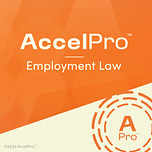Welcome to AccelPro Employment Law, where we provide expert interviews and coaching to accelerate your professional development. Today we’re featuring a conversation about discrimination, harassment and retaliation. Our guest is Carla Brown, a partner at Charlson Bredehoft Cohen Brown & Nadelhaft.
A little-known secret: Most employees, if they are victims of discrimination, harassment or retaliation, don’t want to sue. They want to keep their jobs. They want their issues resolved, not litigated.
One of the best ways to do that is for everyone involved to listen, whether it’s a human resources executive tasked with dealing with the complaints or an attorney hired by the employee. “I think the vast majority (of lawsuits) could be avoided just by that alone,” says Brown, who has decades of experience handling such cases.
Brown joins us to talk about the differences between discrimination, harassment and retaliation, how to recognize them, and best practices to resolve such disputes. The supplemental materials and episode transcript are available below.
AccelPro’s expert interviews and coaching accelerate your professional development. Join AccelPro Employment Law now for a free trial of everything we offer to members.
Interview References:
Carla Brown’s Charlson Bredehoft Cohen Brown & Nadelhaft profile
7:23 | Title VII of the Civil Rights Act of 1964, § 7, 42 U.S.C. § 2000e et seq (1964). US Equal Employment Opportunity Commission.
11:01 | Feldblum, C. R., & Lipnic, V. A. (2016, June). Select Task Force on the Study of Harassment in the Workplace. U.S. Equal Employment Opportunity Commission.
14:42 | Clemetson, Lynette. (2007, February 4). The Racial Politics of Speaking Well. The New York Times.
16:09 | Brown v. Board of Education, 347 U.S. 483 (1954).
TRANSCRIPT
I. DISCRETE, CONTINUOUS AND PUNISHING ACTS
Matt Crossman, Host: Let’s start by defining terms. Discrimination, harassment and retaliation all are interrelated, but they’re also distinct. For human resources executives and employment attorneys, what are some helpful ways to distinguish between them?
Carla Brown: They have an everyday person meaning. Most people understand what discrimination is—that I’ve been treated differently—and legally it’s not different than that.
The question is whether you were treated differently because of a protected category or something the law said you shouldn’t be treated differently based on. So I speak to a lot of people who say I was discriminated against, and under the legal definition they were not.
Discrimination really is a discrete act, right? So a demotion or failing to promote somebody—those are isolated incidents that happen on one particular day. Harassment or a hostile-work environment happen over a series of times. They can be very severe, or they can be less severe, or they can be things that just change your workplace.
But I think of discrimination as a discrete act, and harassment as a number of acts that occurred over a period of time. And then retaliation, I think, is the simplest of all of them. In discrimination, you have to be right that you were discriminated against to win. In harassment, you have to be correct that you are harassed in order to win.
In retaliation, you actually don’t have to be correct that what you complained about is discrimination or harassment. You just have to be punished for raising it. So I try to give the example that somebody could say, “I complained that I was treated differently because I was a black female, and Carla got super mad.”
Maybe I was mad because I thought I would never discriminate against somebody based on what I’ve been through, but I’m mad anyways. So you don’t actually have to be right about the underlying issue. You have to be reasonable about your complaint, but the retaliation is just someone punishing you.
MC: Do HR executives and employment attorneys understand retaliation? What do they need to understand better?
CB: Yes, I think that they do. Although I represent employees, I see highly qualified HR individuals on the other side who are trying, and I see defense attorneys who know the issues well. I think of employment law and HR matters as really a niche, and people who are in it do know what they’re doing pretty well.
The biggest issue I see though, is really that people need to try to be neutral. I think it’s helpful for HR people not to draw a conclusion. Someone complains this happened to me, and the HR person says, “I’m sure it was a misunderstanding, or maybe it was a mix up.”
Until you look into it, how could you possibly have an opinion one way or the other? So I think they understand it, but I would say that you could resolve a lot of issues at a neutral level if you just listened a bit more. Because people make mistakes and people say things incorrectly and those things can be fixed sometimes. But employees feel very nervous if the initial response to their complaint is that it didn’t happen, or you’re misunderstanding it, or some other kind of gaslighting.
That’s not a great way to start things.
—
II. LISTEN BEFORE JUDGING
MC: How much easier would this all be if people listened better, if they didn’t rush the judgment?
CB: I would think a vast majority could be avoided just by that alone. I think there’s a misperception that employees want lawsuits. They don’t.
When people call me, they want to know how they can continue working in their job. They’re nervous. They don’t want to go to HR. They know that there’s consequences, but it gets to the point where maybe they were denied a promotion, their money was messed with, there’s something that they really can’t avoid anymore.
And if they felt like HR was listening, I think that would avoid a lot. Most of the time, unfortunately, if it’s “he said, she said,” then the HR department can’t confirm or deny unless there’s some other corroborating evidence. So the answer’s going to be, “we looked into it and we couldn’t substantiate what you said, and let us know if anything else happens.”
But instead of that response, sometimes it’s, “we looked into it and we didn’t find that what you said was true.” That’s a judgment call for the other person. So just be careful how you word that.
MC: What tips for best practices would you have to make that process better?
Listen to this episode with a 7-day free trial
Subscribe to AccelPro | Employment & Labor Law to listen to this post and get 7 days of free access to the full post archives.












